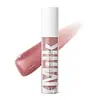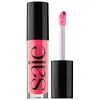What's inside
What's inside
 Key Ingredients
Key Ingredients

 Benefits
Benefits

 Concerns
Concerns

 Ingredients Side-by-side
Ingredients Side-by-side

Sucrose Acetate Isobutyrate
Simmondsia Chinensis Seed Oil
EmollientButyrospermum Parkii Butter
Skin ConditioningAgave Tequilana Leaf Extract
AstringentDipentaerythrityl Hexahydroxystearate/Hexastearate/Hexarosinate
Skin ConditioningJojoba Esters
EmollientIsononyl Isononanoate
EmollientTocopheryl Nicotinate
AntioxidantHelianthus Annuus Seed Wax
Skin ConditioningHelianthus Annuus Seed Oil
EmollientLycium Barbarum Fruit Extract
AstringentPersea Gratissima Oil
Skin ConditioningAcacia Decurrens Flower Wax
EmollientHibiscus Sabdariffa Flower Extract
Skin ConditioningRuby Powder
Skin ConditioningSapphire Powder
Tocopherol
AntioxidantTocopheryl Acetate
AntioxidantSilica Dimethyl Silylate
EmollientOctyldodecanol
EmollientCaprylic/Capric Triglyceride
MaskingPolyglycerin-3
HumectantVanillin
MaskingGlycerin
HumectantWater
Skin ConditioningSilica
AbrasiveMica
Cosmetic ColorantSodium Benzoate
MaskingPotassium Sorbate
PreservativeAroma
Citral
PerfumingLimonene
PerfumingLinalool
PerfumingCI 77891
Cosmetic ColorantIron Oxides
CI 73360
Cosmetic ColorantSucrose Acetate Isobutyrate, Simmondsia Chinensis Seed Oil, Butyrospermum Parkii Butter, Agave Tequilana Leaf Extract, Dipentaerythrityl Hexahydroxystearate/Hexastearate/Hexarosinate, Jojoba Esters, Isononyl Isononanoate, Tocopheryl Nicotinate, Helianthus Annuus Seed Wax, Helianthus Annuus Seed Oil, Lycium Barbarum Fruit Extract, Persea Gratissima Oil, Acacia Decurrens Flower Wax, Hibiscus Sabdariffa Flower Extract, Ruby Powder, Sapphire Powder, Tocopherol, Tocopheryl Acetate, Silica Dimethyl Silylate, Octyldodecanol, Caprylic/Capric Triglyceride, Polyglycerin-3, Vanillin, Glycerin, Water, Silica, Mica, Sodium Benzoate, Potassium Sorbate, Aroma, Citral, Limonene, Linalool, CI 77891, Iron Oxides, CI 73360
Ricinus Communis Seed Oil
MaskingOleic/Linoleic/Linolenic Polyglycerides
EmollientCopernicia Cerifera Wax
Simmondsia Chinensis Seed Oil
EmollientPolyhydroxystearic Acid
EmulsifyingSilica
AbrasiveSodium Hyaluronate
HumectantButyrospermum Parkii Butter
Skin ConditioningCocos Nucifera Oil
MaskingHydrogenated Castor Oil
EmollientStevioside
MaskingWater
Skin ConditioningStevia Rebaudiana Leaf/Stem Extract
MaskingCitric Acid
BufferingCaprylyl Glycol
EmollientSorbitan Oleate
EmulsifyingCI 77891
Cosmetic ColorantIron Oxides
CI 17200
Cosmetic ColorantCI 15850
Cosmetic ColorantCI 15985
Cosmetic ColorantRicinus Communis Seed Oil, Oleic/Linoleic/Linolenic Polyglycerides, Copernicia Cerifera Wax, Simmondsia Chinensis Seed Oil, Polyhydroxystearic Acid, Silica, Sodium Hyaluronate, Butyrospermum Parkii Butter, Cocos Nucifera Oil, Hydrogenated Castor Oil, Stevioside, Water, Stevia Rebaudiana Leaf/Stem Extract, Citric Acid, Caprylyl Glycol, Sorbitan Oleate, CI 77891, Iron Oxides, CI 17200, CI 15850, CI 15985
 Reviews
Reviews

Ingredients Explained
These ingredients are found in both products.
Ingredients higher up in an ingredient list are typically present in a larger amount.
This ingredient is also known as shea butter. It is an effective skin hydrator and emollient.
Emollients help soothe and soften your skin. It does this by creating a protective film on your skin. This barrier helps trap moisture and keeps your skin hydrated. Emollients may be effective at treating dry or itchy skin.
Shea butter is rich in antioxidants. Antioxidants help fight free-radicals, or molecules that may harm the body. It is also full of fatty acids including stearic acid and linoleic acid. These acids help replenish the skin and keep skin moisturized.
While Shea Butter has an SPF rating of about 3-4, it is not a sunscreen replacement.
Shea butter may not be fungal acne safe. We recommend speaking with a professional if you have any concerns.
Learn more about Butyrospermum Parkii ButterCi 77891 is a white pigment from Titanium dioxide. It is naturally found in minerals such as rutile and ilmenite.
It's main function is to add a white color to cosmetics. It can also be mixed with other colors to create different shades.
Ci 77891 is commonly found in sunscreens due to its ability to block UV rays.
Learn more about CI 77891Silica, also known as silicon dioxide, is a naturally occurring mineral. It is used as a fine, spherical, and porous powder in cosmetics.
Though it has exfoliant properties, the function of silica varies depending on the product.
The unique structure of silica enhances the spreadability and adds smoothness, making it a great texture enhancer.
It is also used as an active carrier, emulsifier, and mattifier due to its ability to absorb excess oil.
In some products, tiny microneedles called spicules are made from silica or hydrolyzed sponge. When you rub them in, they lightly polish away dead skin layers and enhance the penetration of active ingredients.
Learn more about SilicaThis oil comes from the seeds of the desert shrub called Jojoba. It is more commonly known as jojoba oil, a non-comedogenic oil.
Jojoba oil does not contain fragrance and has many fatty-acids, making it a great soothing ingredient.
It also contains Vitamin E, a great moisturizing ingredient. Vitamin E is also an antioxidant and protects your skin against oxidative damage.
This ingredient humectant properties, meaning it helps draw moisture from the air. This helps keep your skin hydrated.
While jojoba has antibacterial properties, it is only able to kill some strains of bacteria.
Studies also show it helps in wound healing. In fact, Indigenous cultures have used jojoba as a moisturizer and to help treat burns for centuries.
Fun fact: Jojoba oil similar to natural human skin sebum, so it has a great effect on dry skin. It is also promising with helping to regulate sebum production.
Due to its fatty acid content, Jojoba oil may not be fungal acne safe. We recommend speaking with a professional if you have any concerns.
Learn more about Simmondsia Chinensis Seed OilWater. It's the most common cosmetic ingredient of all. You'll usually see it at the top of ingredient lists, meaning that it makes up the largest part of the product.
So why is it so popular? Water most often acts as a solvent - this means that it helps dissolve other ingredients into the formulation.
You'll also recognize water as that liquid we all need to stay alive. If you see this, drink a glass of water. Stay hydrated!
Learn more about WaterThis ingredient is a combination of red, black, and yellow iron oxide pigments. This combination of colors is usually found in foundation, because it results in a "skin" color.